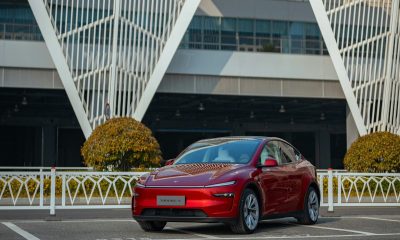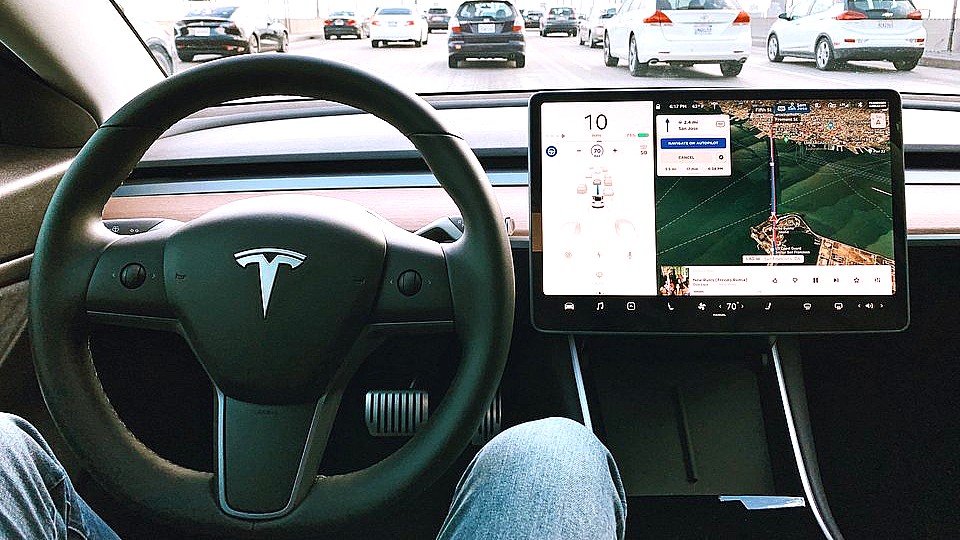

Firmware
Tesla’s inclusion of Autopilot on every car unravels a long-term Full Self-Driving strategy
Starting today, every Tesla that is sold will be delivered with Autopilot as a standard feature. This adjusts the prices of vehicles save for the off-menu Standard Model 3, but it gives all of Tesla’s electric cars moving forward a ready-to-deploy driver-assist system that is among the best available in the market today.
Tesla announced the updates to its vehicle lineup on Thursday, immediately following the successful launch of SpaceX’s Falcon Heavy, an event that was tied with the electric car maker’s previous referral program. In a blog post, Tesla explained that its decision to make Autopilot a standard feature for its vehicles is driven by the company’s data, which indicated that using the driver-assist system responsibly reduces the chances of accidents on the road.
“We think including Autopilot is very important because our data strongly indicates that the chance of an accident is much lower when Autopilot is enabled. Autopilot also dramatically improves the quality of the driving experience, especially in heavy traffic, as thousands of our customers frequently describe online,” Tesla wrote.
A long-term Full Self-Driving play
This recent strategy all but highlights a point that Elon Musk appears to be hinting at over the past few months: 2019 is a year where Tesla is pushing its efforts to bring full self-driving features to market. Together with the release of advanced capabilities like Enhanced Summon and Navigate on Autopilot with unconfirmed lane changes, Tesla is all but positioning itself as a provider of autonomous driving features for the mass market. This also ensures that it can gather more real-world driving data than ever before.
Autopilot’s inclusion as a standard feature has been a long time coming. Over the years, Tesla has focused on refining its driver-assist system to ensure that it operates safely and in a manner that is convenient for electric car owners, as seen in the constant and deliberate improvements to Autopilot that have been released so far. The company even developed its own custom chip, Hardware 3, to ensure that its vehicles will have enough processing power to operate completely on their own without slowing down their systems.
The ride-sharing endgame
A big endgame for Tesla is the deployment of the Tesla Network, which relies on the company’s vehicles attaining full self-driving capabilities. Under the Tesla Network, the company’s electric cars will operate as ride-sharing vehicles that can earn on their own without their owners doing anything. The Tesla Network was highlighted by the electric car maker in its recent blog post, with the company stating that vehicles coming off their leases will be used for the fully autonomous ride-sharing service.
Musk previously noted that the Tesla Network will be competing with popular ride-sharing services in the market today, such as Uber and Lyft. The only difference between Tesla and its popular competitors is that the electric car maker’s vehicles are unmanned, allowing owners and the company itself to earn more for the service. This was something that Elon Musk himself highlighted in the past. “We would charge something comparable to how you’d say the App Store works, or I don’t know, we’d charge 30% or something in order for somebody to add the car to the fleet. I think that’s a pretty sensible way to go,” Musk said.
Another disruption in the making
Apart from the advantages of having an unmanned fleet, the Tesla Network is also backed by the company’s capability to ramp the production of its electric cars. Uber currently has approximately 2 million drivers today, while Lyft has around 1.4 million. Tesla is expected to have around 1 million vehicles on the road by the end of 2020 (particularly with the rollout of the Model Y). If the electric car maker can refine its Full Self-Driving features by then, the Tesla Network could enter the ride-sharing market with a fleet of vehicles that already rivals some of the industry’s biggest players.
Tesla’s proficiency as a company that develops self-driving technology is usually overlooked. Tesla is currently valued at around $46 billion, which is not bad for a carmaker, but it is a valuation that seriously undercuts the worth of Autopilot’s real-world driving data. Tesla quite literally has over a billion miles of data from its ever-growing fleet, which helps the company’s vehicles operate their driver-assist features in non-geofenced areas. Waymo, a leader in self-driving technology, is currently still mastering geofenced driving, but Morgan Stanley already estimates the company to be worth $175 billion, over three times the current valuation of Tesla.
Firmware
Tesla mobile app shows signs of upcoming FSD subscriptions
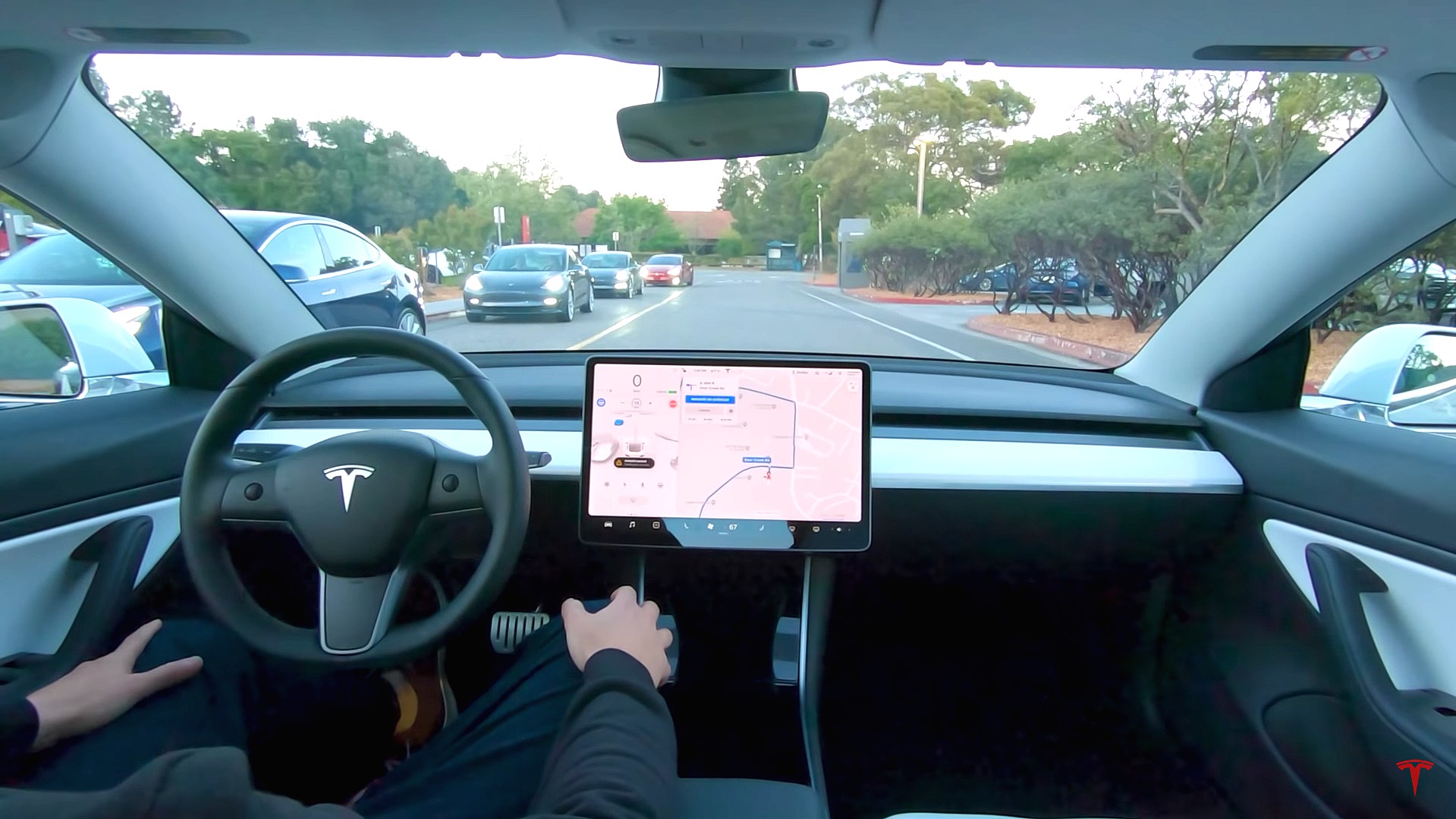
It appears that Tesla may be preparing to roll out some subscription-based services soon. Based on the observations of a Wales-based Model 3 owner who performed some reverse-engineering on the Tesla mobile app, it seems that the electric car maker has added a new “Subscribe” option beside the “Buy” option within the “Upgrades” tab, at least behind the scenes.
A screenshot of the new option was posted in the r/TeslaMotors subreddit, and while the Tesla owner in question, u/Callump01, admitted that the screenshot looks like something that could be easily fabricated, he did submit proof of his reverse-engineering to the community’s moderators. The moderators of the r/TeslaMotors subreddit confirmed the legitimacy of the Model 3 owner’s work, further suggesting that subscription options may indeed be coming to Tesla owners soon.
Did some reverse engineering on the app and Tesla looks to be preparing for subscriptions? from r/teslamotors
Tesla’s Full Self-Driving suite has been heavily speculated to be offered as a subscription option, similar to the company’s Premium Connectivity feature. And back in April, noted Tesla hacker @greentheonly stated that the company’s vehicles already had the source codes for a pay-as-you-go subscription model. The Tesla hacker suggested then that Tesla would likely release such a feature by the end of the year — something that Elon Musk also suggested in the first-quarter earnings call. “I think we will offer Full Self-Driving as a subscription service, but it will be probably towards the end of this year,” Musk stated.
While the signs for an upcoming FSD subscription option seem to be getting more and more prominent as the year approaches its final quarter, the details for such a feature are still quite slim. Pricing for FSD subscriptions, for example, have not been teased by Elon Musk yet, though he has stated on Twitter that purchasing the suite upfront would be more worth it in the long term. References to the feature in the vehicles’ source code, and now in the Tesla mobile app, also listed no references to pricing.
The idea of FSD subscriptions could prove quite popular among electric car owners, especially since it would allow budget-conscious customers to make the most out of the company’s driver-assist and self-driving systems without committing to the features’ full price. The current price of the Full Self-Driving suite is no joke, after all, being listed at $8,000 on top of a vehicle’s cost. By offering subscriptions to features like Navigate on Autopilot with automatic lane changes, owners could gain access to advanced functions only as they are needed.
Elon Musk, for his part, has explained that ultimately, he still believes that purchasing the Full Self-Driving suite outright provides the most value to customers, as it is an investment that would pay off in the future. “I should say, it will still make sense to buy FSD as an option as in our view, buying FSD is an investment in the future. And we are confident that it is an investment that will pay off to the consumer – to the benefit of the consumer.” Musk said.
Firmware
Tesla rolls out speed limit sign recognition and green traffic light alert in new update
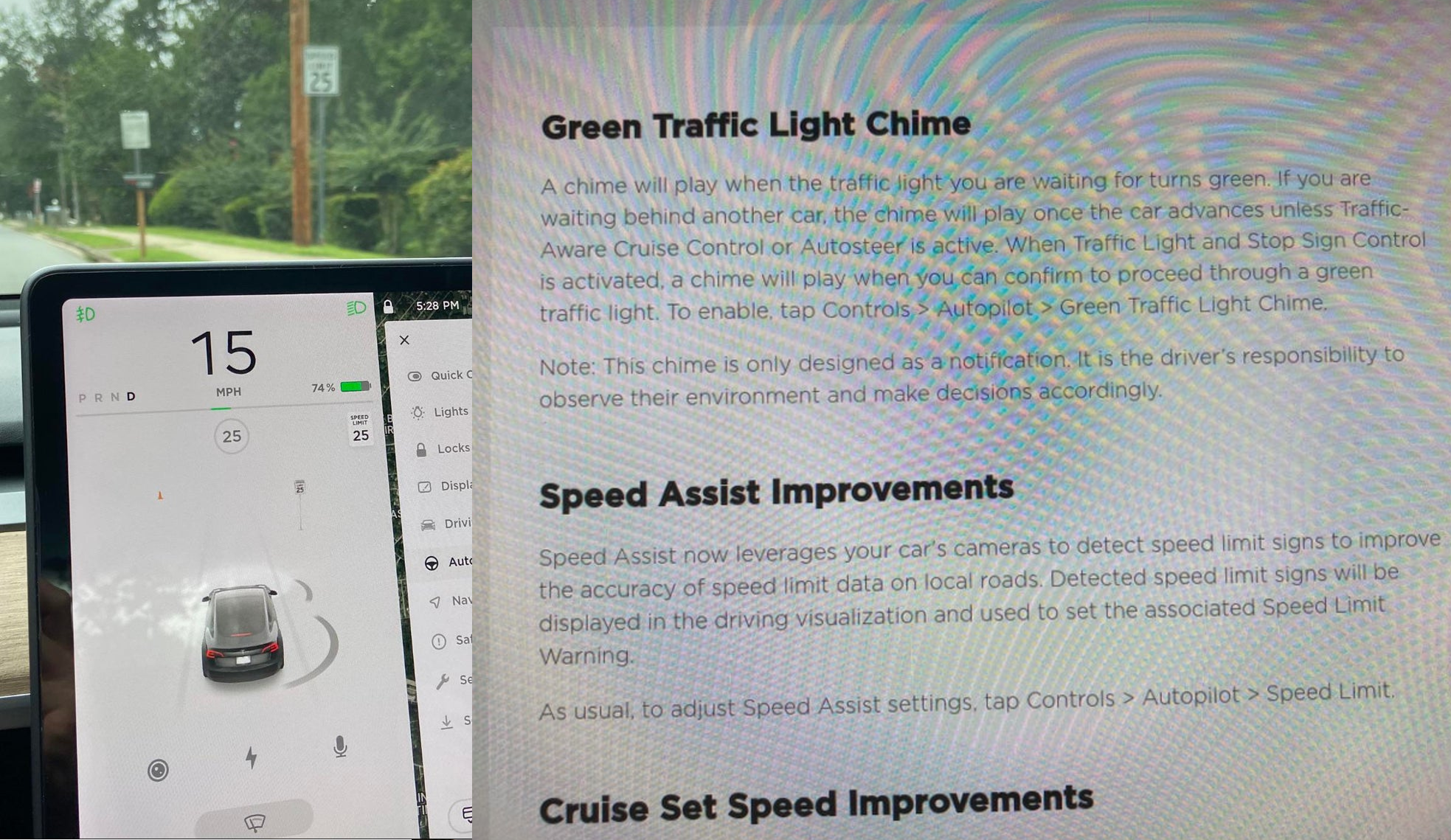
Tesla has started rolling out update 2020.36 this weekend, introducing a couple of notable new features for its vehicles. While there are only a few handful of vehicles that have reportedly received the update so far, 2020.36 makes it evident that the electric car maker has made some strides in its efforts to refine its driver-assist systems for inner-city driving.
Tesla is currently hard at work developing key features for its Full Self-Driving suite, which should allow vehicles to navigate through inner-city streets without driver input. Tesla’s FSD suite is still a work in progress, though the company has released the initial iterations of key features such Traffic Light and Stop Sign Control, which was introduced last April. Similar to the first release of Navigate on Autopilot, however, the capabilities of Traffic Light and Stop Sign Control were pretty basic during their initial rollout.
2020.36 Showing Speed Limit Signs in Visualization from r/teslamotors
With the release of update 2020.36, Tesla has rolled out some improvements that should allow its vehicles to handle traffic lights better. What’s more, the update also includes a particularly useful feature that enables better recognition of speed limit signs, which should make Autopilot’s speed adjustments better during use. Following are the Release Notes for these two new features.
Green Traffic Light Chime
“A chime will play when the traffic light you are waiting for turns green. If you are waiting behind another car, the chime will play once the car advances unless Traffic-Aware Cruise Control or Autosteer is active. When Traffic Light and Stop Sign Control is activated, a chime will play when you can confirm to proceed through a green traffic light. To enable, tap Controls > Autopilot > Green Traffic Light Chime.
“Note: This chime is only designed as a notification. It is the driver’s responsibility to observe their environment and make decisions accordingly.”
Speed Assist Improvements
“Speed Assist now leverages your car’s cameras to detect speed limit signs to improve the accuracy of speed limit data on local roads. Detected speed limit signs will be displayed in the driving visualization and used to set the associated Speed Limit Warning.
“As usual, to adjust Speed Assist settings, tap Controls > Autopilot > Speed Limit.”
Footage of the new green light chime in action via @NASA8500 on Twitter ✈️ from r/teslamotors
Amidst the rollout of 2020.36’s new features, speculations were abounding among Tesla community members that this update may include the first pieces of the company’s highly-anticipated Autopilot rewrite. Inasmuch as the idea is exciting, however, Tesla CEO Elon Musk has stated that this was not the case. While responding to a Tesla owner who asked if the Autopilot rewrite is in “shadow mode” in 2020.36, Musk responded “Not yet.”
Firmware
Tesla rolls out Sirius XM free three-month subscription
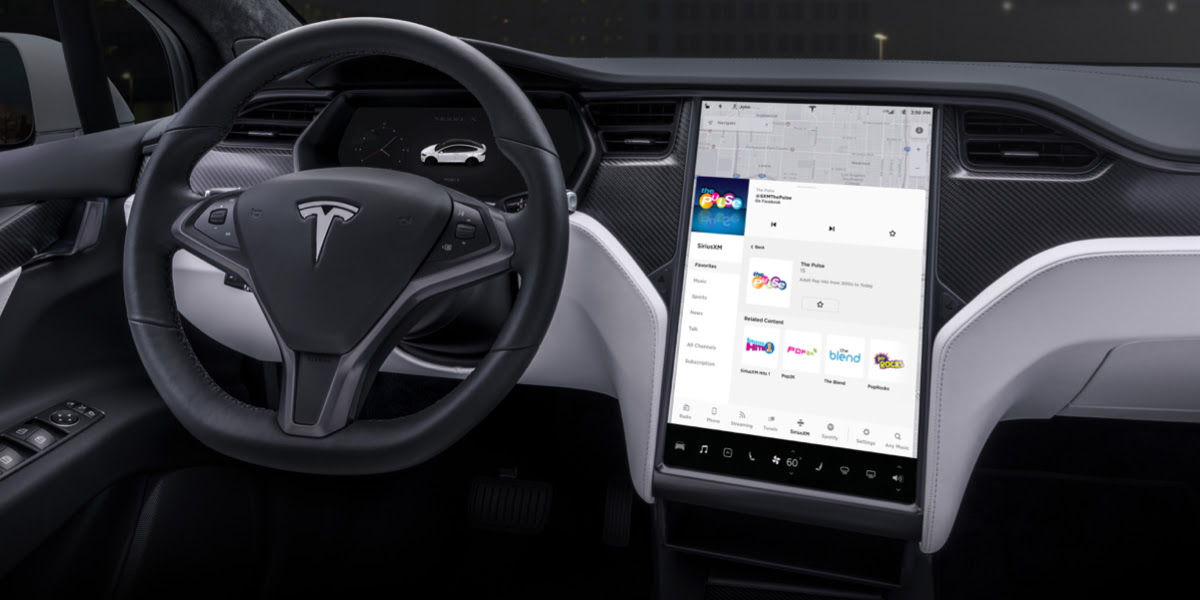
Tesla has rolled out a free three-month trial subscription to Sirius XM, in what appears to be the company’s latest push into making its vehicles’ entertainment systems more feature-rich. The new Sirius XM offer will likely be appreciated by owners of the company’s vehicles, especially considering that the service is among the most popular satellite radios in the country today.
Tesla announced its new offer in an email sent on Monday. An image that accompanied the communication also teased Tesla’s updated and optimized Sirius XM UI for its vehicles. Following is the email’s text.
“Beginning now, enjoy a free, All Access three-month trial subscription to Sirius XM, plus a completely new look and improved functionality. Our latest over-the-air software update includes significant improvements to overall Sirius XM navigation, organization, and search features, including access to more than 150 satellite channels.
“To access simply tap the Sirius XM app from the ‘Music’ section of your in-car center touchscreen—or enjoy your subscription online, on your phone, or at home on connected devices. If you can’t hear SiriusXM channels in your car, select the Sirius XM ‘Subscription’ tab for instruction on how to refresh your audio.”
Tesla has actually been working on Sirius XM improvements for some time now. Back in June, for example, Tesla rolled out its 2020.24.6.4 update, and it included some optimizations to its Model S and Model X’s Sirius XM interface. As noted by noted Tesla owner and hacker @greentheonly, the source code of this update revealed that the Sirius XM optimizations were also intended to be released to other areas such as Canada.
Interestingly enough, Sirius XM is a popular feature that has been exclusive to the Model S and X. Tesla’s most popular vehicle to date, the Model 3, is yet to receive the feature. One could only hope that Sirius XM integration to the Model 3 may eventually be included in the future. Such an update would most definitely be appreciated by the EV community, especially since some Model 3 owners have resorted to using their smartphones or third-party solutions to gain access to the satellite radio service.
The fact that Tesla seems to be pushing Sirius XM rather assertively to its customers seems to suggest that the company may be poised to roll out more entertainment-based apps in the coming months. Apps such as Sirius XM, Spotify, Netflix, and YouTube, may seem quite minor when compared to key functions like Autopilot, after all, but they do help round out the ownership experience of Tesla owners. In a way, Sirius XM does make sense for Tesla’s next-generation of vehicles, especially the Cybertruck and the Semi, both of which would likely be driven in areas that lack LTE connectivity.
-

 Elon Musk1 day ago
Elon Musk1 day agoTesla investors will be shocked by Jim Cramer’s latest assessment
-

 News6 days ago
News6 days agoTesla Robotaxi’s biggest challenge seems to be this one thing
-

 News2 weeks ago
News2 weeks agoTesla’s Grok integration will be more realistic with this cool feature
-

 Elon Musk2 weeks ago
Elon Musk2 weeks agoElon Musk slams Bloomberg’s shocking xAI cash burn claims
-

 News2 weeks ago
News2 weeks agoTesla China roars back with highest vehicle registrations this Q2 so far
-

 News2 weeks ago
News2 weeks agoTexas lawmakers urge Tesla to delay Austin robotaxi launch to September
-

 News2 weeks ago
News2 weeks agoTesla dominates Cars.com’s Made in America Index with clean sweep
-

 Elon Musk1 week ago
Elon Musk1 week agoFirst Look at Tesla’s Robotaxi App: features, design, and more






